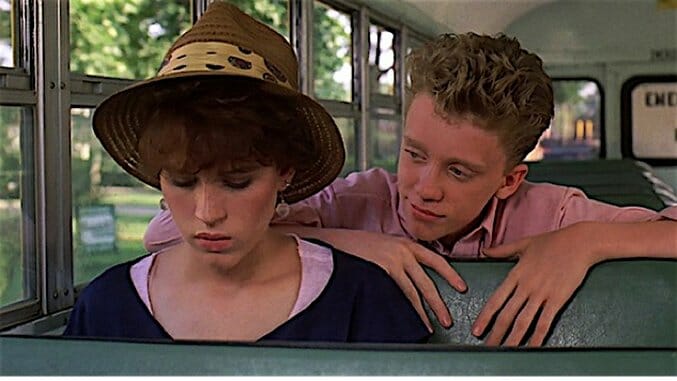Hang Up the Phone: Introducing a Teen to the Teen Canon of the 1980s
Part 3: Sixteen Candles

Previously, we’ve established John Hughes as fair game for the 14-year-old. The Breakfast Club was starting to propagate its way into the viewing queues of several members of her local Geek Squad, and Grace’s post Pretty in Pink comment about the ’80s being the “last optimistic decade” was resonating uncomfortably. This was partly because of the reasons why I disagreed—partly because of the part of me that kind of suspected she was right.
Sixteen Candles seemed like an obvious next choice. Continuing the thread of teen angst coupled with class and social strata issues, anchored by the eternally and preternaturally pouty mouth of Molly Ringwald, but with a slightly more juvenile and ribald sense of humor. Right?
This is in the category of film I did not think was funny or interesting at the time, though I know many, many people who did. I wondered if I’d appreciate it in a new or at least a nostalgic way, and I wondered if it was Teen Archetypal enough to jump the generational divide.
The elements were there. Hughes’ awesome ear for soundtrack. The First World Problems of generally white teens, some scions of rich families, some scrappy working class types: Their sex lives or lack thereof, their ambivalence about what comes after high school, the eternal quest for peer approval. It’s a lightweight for sure, full of awkward intergenerational goofballery and a sulky, sulky Ringwald in a snit because no one has remembered her birthday. (In their defense, it happens to also be her sister’s wedding the next day and all of the grandparents, who are weirdos, have camped out at the house. Sam (Ringwald) likes a popular jock boy, Jake (Michael Schoeffling). Ted (Anthony Michael Hall) is after Sam. (It is not mutual.)
“Oh. My. God.” Grace had smooshed a pillow over her ears and I knew why. Gedde Watanabe had just arrived on scene, complete with crashing-cymbal “theme song.”
“I know.”
Does Hughes know that Chinese and Japanese are two different things?” she asked scathingly as Watanabe bravely endured the only actually slapstick role in the film and capered around speaking quasi-Pidgin nonsense.
“He’s dead, so presumably he got the download by now.”
“That’s just … embarrassing. Was this funny in the ’80s?”
“A lot of people thought so. Roger Ebert said he turned a potentially offensive stereotype into high comedy.”
“Translation,” she said, “he didn’t want to sound like he was blaming this guy for taking the role. Ugh.”
-

-

-

-

-

-

-

-

-

-

-

-

-

-

-

-

-

-

-

-

-

-

-

-

-

-

-

-

-

-

-

-

-

-

-

-

-

-

-

-








































